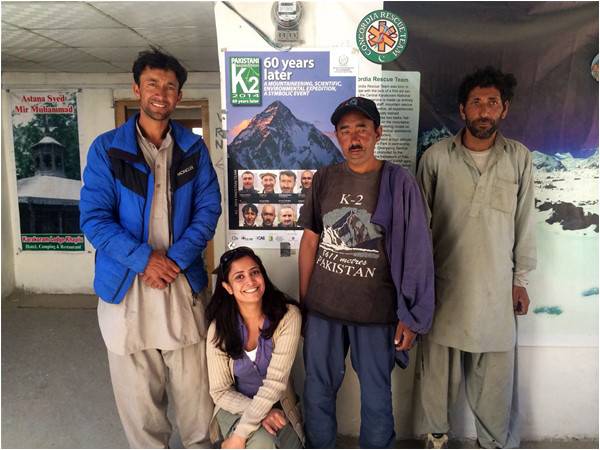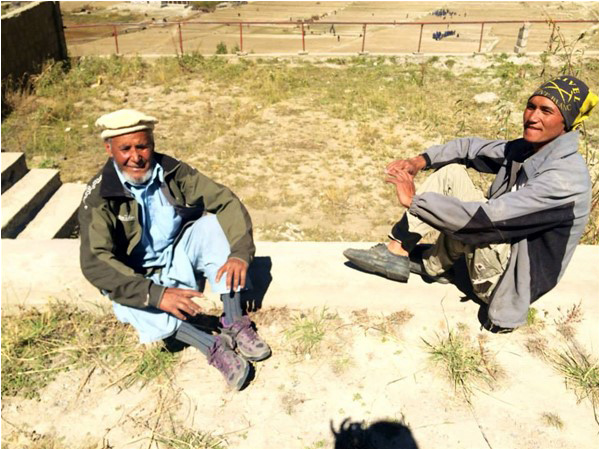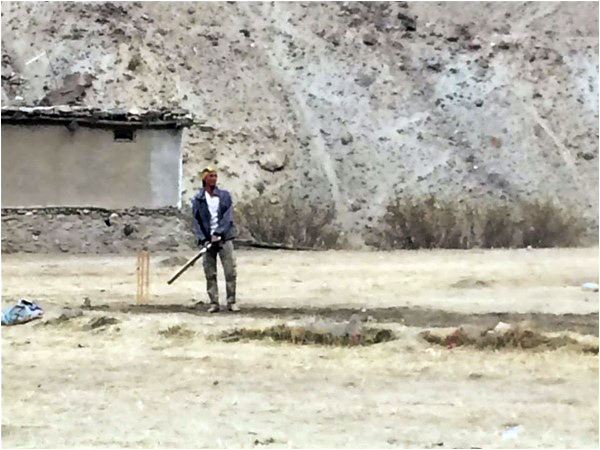
“Let the beauty we love be what we do. There are hundreds of ways to kneel and kiss the ground”. (Mevlana Jalaluddin Rumi)
On the 11th of December, International Mountain Day is celebrated all over the world. This occasion, in my humble opinion, is important and we must celebrate the people who make our mountains great – the ones truly in tune with what Rumi was talking about. I was honoured to meet some of these people in 2014 and the first all-Pakistani team had just returned from an ascent of K-2. On the 60th anniversary of the first successful climb by an Italian team on the “savage mountain”, the trip had been sponsored by an Italian organisation “Ev-K2-CNR” in cooperation with the Gilgit-Baltistan government as a gesture of goodwill. I had hurriedly arrived in Hushe that year to meet the climbing prodigy Ali Durrani, the youngest Pakistani to scale the peak and incidentally also the first of his team to reach this elusive, much sought-after summit.
Hushe, the home village of six of the eight-member team is a wonderful little gem in the Ghanche District of Baltistan. Due to its remoteness (the last and highest village in the valley) most of its men have been working as high altitude and expedition staff for decades. Durrani was easy to find – grabbing the first child I saw, I asked where he lived and if I could be taken there. Displaying true northern hospitality instead, this accomplished young man arrived at my hotel half an hour later: so as not to “cause a lady any hardship”.
He was a shy youth with a cautious smile. It seemed almost unconceivable that this gentle boy of 24 had beaten everyone to the top that summer. As I quizzed him on the first thing he did when reaching this incredible milestone in his life and Pakistan’s history, his innocence shone out as he very earnestly said that he first prayed to God and then waved Pakistan’s flag. He also added that while he waited for the rest of the team, he treated himself to a cigarette. Exasperated by his answer I asked him why he would do that in light of the fact that he was the youngest Pakistani ever on top of K-2, and so, besides the low oxygen levels he was also a role model for many of the young climbers in the country. Looking down at his feet, he softy said he was cold and had run out of food and water sometime before reaching the top. The only thing to do was to sit, wait and have a smoke. Simple man, simple words. He said very little more. I was later to find out that not only was he shy and possibly intimidated by talking at such length with a woman and that he had also “used up all his Urdu” very early on in the interview. Refusal to talk about himself and his accomplishments anymore was not only due to his natural humility but was also connected, at least in part, to the fact that he literally had no more words left in our common tongue!
Hushe is also the home of Abdul “Little” Karim, one of Pakistan’s most accomplished and honourable local climbers. Like Ali Durrani, he had also etched his name into Pakistan’s climbing history early in his life by various near-impossible feats. Starting his career with the famous Chris Bonington in 1978 his tiny frame of 5’2” once lugged 25 kg up 8000m on Gasherbrum II – an almost unattainable feat. He also once went from the base camp of K-2 to the top of Broad Peak in a single day because apparently his friends (Spaniards he climbed with often) were “waiting for him”. “Woh mera intazar kar raha tha, tu main bhag kay ooper giya” were his exact words while describing the incredible day to me.

The humble and generous nature of the men from Hushe is something that never ceases to amaze and bring warmth to my heart. After interviewing Ali and the rest of the amazing team, I made my yearly pilgrimage to Little Karim’s house for tea and mountain dew (that foul yellow liquid unfortunately seems to show up at every table in the north). Karim talked at length that day on how proud he was that the younger members of the village, like Durrani, were continuing the proud tradition. Later that day as he walked me back to my guest house, talking about his younger climbing days, a strange silence suddenly fell on this normally vocal man. Following his eye, I saw him transfixed on most of the village, which had gathered around a cricket match in the centre. “Everybody is obsessed with cricket these days!” he said with a soft faraway look in his eyes. “Look around you, most of these people would rather play cricket than learn about their national treasures, right here in our backyard.” Standing in the shadow of the great Mashabrum, looking longingly at an old friend he can no longer climb due to his age, Karim cut a touching figure of nostalgia. With that a deeper quiet fell over both of us as he bid me farewell.
It is true. Nature is a far better playmate than a ball and bat!
Walking on, I thought I might as well join the crowd as that this would likely be the only entertainment I would get that night. Hushe has no real connection to the entertainment world, even mobile networks at that time could only be reached on a certain space out of the village – while standing on a little hill. So, while feeling slightly treasonous to the noble Little Karim I slunk over and took a seat on a rock at the edge of the ground. The field was a small patch of clear land being shared by the cricketers and the goats being brought back home by the women from the pastures. On the other edge I could see Little Karim herding a cow somewhere. I tried to hide behind the rock unsuccessfully as he caught sight of me attempting to bond with the cricket generation. But this generous man only smiled and yelled at me to come for dinner or he would “pull my ears”.

Coming up to bat, towering above most of the other players, was Ali Durrani. Barefoot in old climbing pants, jacket and a bandana on his head, he was a curious mix of East and West, villager and athlete, boy and man. As the fast bowler barreled down on him, I was dead sure that ball was going to the Mashabrum base camp at least. Surely everything this young man touched would have some serious altitude, right? Wrong. The wicket went to pieces and the only altitude gained was by my arms, which were half raised to clap and cheer. Therein followed the most original jeers I have ever heard aimed at a cricketer (I translate the mixture of Balti and Urdu to the best of my abilities).
“He can run up K2 but can’t hit a ball!”
“You should have just stayed up there. Did you come back only to embarrass yourself?”
“Hey Ali! You know how to use an ice-axe but can’t hold a bat? Shame on you!”
As the whole village shouted various inventive versions of such themes, the youngest Pakistani ever to reach the top smiled sheepishly and disappeared into the crowd. Maybe mountaineering isn’t for everyone but clearly, neither is cricket.
Proper respect, however, must be accorded to those who love the mountains – and we have many of them. We just need to go and find them.
On the 11th of December, International Mountain Day is celebrated all over the world. This occasion, in my humble opinion, is important and we must celebrate the people who make our mountains great – the ones truly in tune with what Rumi was talking about. I was honoured to meet some of these people in 2014 and the first all-Pakistani team had just returned from an ascent of K-2. On the 60th anniversary of the first successful climb by an Italian team on the “savage mountain”, the trip had been sponsored by an Italian organisation “Ev-K2-CNR” in cooperation with the Gilgit-Baltistan government as a gesture of goodwill. I had hurriedly arrived in Hushe that year to meet the climbing prodigy Ali Durrani, the youngest Pakistani to scale the peak and incidentally also the first of his team to reach this elusive, much sought-after summit.
Hushe, the home village of six of the eight-member team is a wonderful little gem in the Ghanche District of Baltistan. Due to its remoteness (the last and highest village in the valley) most of its men have been working as high altitude and expedition staff for decades. Durrani was easy to find – grabbing the first child I saw, I asked where he lived and if I could be taken there. Displaying true northern hospitality instead, this accomplished young man arrived at my hotel half an hour later: so as not to “cause a lady any hardship”.
Standing in the shadow of the great Mashabrum, looking longingly at an old friend he can no longer climb due to his age, Karim cut a touching figure of nostalgia
He was a shy youth with a cautious smile. It seemed almost unconceivable that this gentle boy of 24 had beaten everyone to the top that summer. As I quizzed him on the first thing he did when reaching this incredible milestone in his life and Pakistan’s history, his innocence shone out as he very earnestly said that he first prayed to God and then waved Pakistan’s flag. He also added that while he waited for the rest of the team, he treated himself to a cigarette. Exasperated by his answer I asked him why he would do that in light of the fact that he was the youngest Pakistani ever on top of K-2, and so, besides the low oxygen levels he was also a role model for many of the young climbers in the country. Looking down at his feet, he softy said he was cold and had run out of food and water sometime before reaching the top. The only thing to do was to sit, wait and have a smoke. Simple man, simple words. He said very little more. I was later to find out that not only was he shy and possibly intimidated by talking at such length with a woman and that he had also “used up all his Urdu” very early on in the interview. Refusal to talk about himself and his accomplishments anymore was not only due to his natural humility but was also connected, at least in part, to the fact that he literally had no more words left in our common tongue!
Hushe is also the home of Abdul “Little” Karim, one of Pakistan’s most accomplished and honourable local climbers. Like Ali Durrani, he had also etched his name into Pakistan’s climbing history early in his life by various near-impossible feats. Starting his career with the famous Chris Bonington in 1978 his tiny frame of 5’2” once lugged 25 kg up 8000m on Gasherbrum II – an almost unattainable feat. He also once went from the base camp of K-2 to the top of Broad Peak in a single day because apparently his friends (Spaniards he climbed with often) were “waiting for him”. “Woh mera intazar kar raha tha, tu main bhag kay ooper giya” were his exact words while describing the incredible day to me.

The humble and generous nature of the men from Hushe is something that never ceases to amaze and bring warmth to my heart. After interviewing Ali and the rest of the amazing team, I made my yearly pilgrimage to Little Karim’s house for tea and mountain dew (that foul yellow liquid unfortunately seems to show up at every table in the north). Karim talked at length that day on how proud he was that the younger members of the village, like Durrani, were continuing the proud tradition. Later that day as he walked me back to my guest house, talking about his younger climbing days, a strange silence suddenly fell on this normally vocal man. Following his eye, I saw him transfixed on most of the village, which had gathered around a cricket match in the centre. “Everybody is obsessed with cricket these days!” he said with a soft faraway look in his eyes. “Look around you, most of these people would rather play cricket than learn about their national treasures, right here in our backyard.” Standing in the shadow of the great Mashabrum, looking longingly at an old friend he can no longer climb due to his age, Karim cut a touching figure of nostalgia. With that a deeper quiet fell over both of us as he bid me farewell.
It is true. Nature is a far better playmate than a ball and bat!
Walking on, I thought I might as well join the crowd as that this would likely be the only entertainment I would get that night. Hushe has no real connection to the entertainment world, even mobile networks at that time could only be reached on a certain space out of the village – while standing on a little hill. So, while feeling slightly treasonous to the noble Little Karim I slunk over and took a seat on a rock at the edge of the ground. The field was a small patch of clear land being shared by the cricketers and the goats being brought back home by the women from the pastures. On the other edge I could see Little Karim herding a cow somewhere. I tried to hide behind the rock unsuccessfully as he caught sight of me attempting to bond with the cricket generation. But this generous man only smiled and yelled at me to come for dinner or he would “pull my ears”.

Coming up to bat, towering above most of the other players, was Ali Durrani. Barefoot in old climbing pants, jacket and a bandana on his head, he was a curious mix of East and West, villager and athlete, boy and man. As the fast bowler barreled down on him, I was dead sure that ball was going to the Mashabrum base camp at least. Surely everything this young man touched would have some serious altitude, right? Wrong. The wicket went to pieces and the only altitude gained was by my arms, which were half raised to clap and cheer. Therein followed the most original jeers I have ever heard aimed at a cricketer (I translate the mixture of Balti and Urdu to the best of my abilities).
“He can run up K2 but can’t hit a ball!”
“You should have just stayed up there. Did you come back only to embarrass yourself?”
“Hey Ali! You know how to use an ice-axe but can’t hold a bat? Shame on you!”
As the whole village shouted various inventive versions of such themes, the youngest Pakistani ever to reach the top smiled sheepishly and disappeared into the crowd. Maybe mountaineering isn’t for everyone but clearly, neither is cricket.
Proper respect, however, must be accorded to those who love the mountains – and we have many of them. We just need to go and find them.

